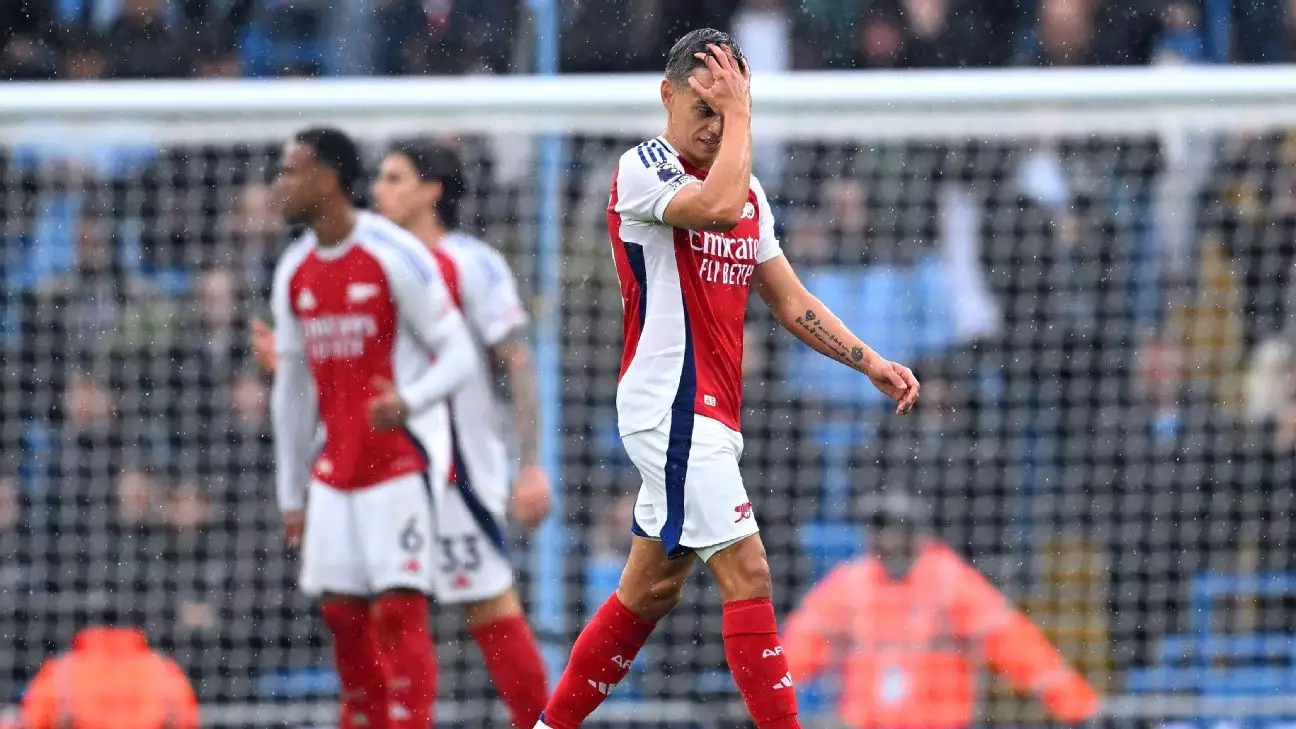In the ever-competitive landscape of the Premier League, managing player discipline is pivotal for success, and Mikel Arteta is acutely aware of this reality. His recent remarks about expecting a significant number of matches to feature red cards draw attention to an underlying trend in football. Arsenal’s recent 2-2 draw against Manchester City was not just another match; it encapsulated the intense emotions and strategic intricacies within high-stakes football. The incident that led to Leandro Trossard’s dismissal exemplifies how a single moment can shift the momentum of a match and, consequently, a team’s standing in the league.
Initially, the game seemed to favor Arsenal, with Erling Haaland kicking things off by putting Manchester City ahead in the ninth minute. Arsenal responded with resolute determination, overturning the deficit through Riccardo Calafiori and Gabriel Magalhães. However, the turning point came shortly before the half-time whistle when Trossard, having already received a yellow card, committed another foul followed by a reckless display of frustration as he kicked the ball away. Referee Michael Oliver’s decision to issue a second yellow card was not just about punishing Trossard but became symbolic of broader concerns regarding player conduct and game management, especially when teams are under pressure.
Arteta’s frustration was palpable as he navigated the complexities of the match. He noted that this was the second time in quick succession that Arsenal faced a red card in similarly contentious circumstances—Declan Rice’s dismissal against Brighton being the first. Such recurring events shook Arteta’s faith in the flow of the game, leading him to declare his expectation of numerous 10-against-11 scenarios throughout the season. His anticipation signals a growing concern regarding the standard of officiating and the management of match situations that could be intensely scrutinized.
The notion of “time added on” is another point of contention Arteta highlighted. As City unearthed the equalizer through John Stones in the dying moments of the match, questions arose about the fairness and reasoning behind the amount of time extended. After a game where City dominated the second half, Arteta reflected on the relentless pressure faced by his players—over 20 shots taken by City, none from Arsenal—implying that such conditions are not just challenging but borderline unfair. This begs the question: how can the integrity of the game be preserved when refereeing decisions and time management are consistently under the spotlight?
Despite the turmoil, Arteta praised his team for their unyielding spirit in the face of adversity. Down to ten men against a formidable opponent such as Manchester City is a daunting circumstance, yet Arsenal managed to hold on until the very end. Their resilience and ability to fend off relentless attacks were commendable, and Arteta recognized the heart and soul his players poured into their performance. The emotional aftermath of conceding a goal in the 98th minute resonates deeply; it emphasizes the psychological toll that such incidents can have on players who have given everything on the pitch.
Arteta’s strategic insight into the concrete actions his team had taken throughout the match also emphasizes a critical point: cultivating mental fortitude is just as crucial as physical endurance in top-flight football. The team’s rapid response to setbacks could very well define their trajectory for the season. Holding onto pride amid countless challenges is a testament to the character of this Arsenal squad, and it holds promise for future encounters.
Arteta’s outspoken perspective on refereeing and discipline may reverberate throughout the league, affecting how other managers and players approach similar situations. The impact of red cards extends beyond individual matches; they encapsulate broader themes of accountability, consistency in officiating, and the mental aspects of competition under pressure. As the season unfolds, Arteta’s insights into how the dynamics of discipline shape games will undoubtedly influence discussions across Premier League circles, as teams strive to balance aggression with tactical discipline to secure points. Ultimately, the landscape of the league may very well hinge on this delicate equilibrium.
This season promises to be a rollercoaster, and with Arteta’s expectations of high-level drama and uncertainty concerning discipline, fans and players alike are in for an exhilarating journey.

